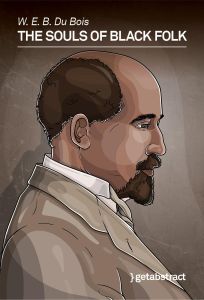
The Souls of Black Folk
- Sociology
- Realism
What It’s About
W.E.B. Du Bois was a unique figure in his day. He was a well-traveled writer and thinker with a superb education, culminating with the first-ever doctorate a black American earned at Harvard. From his early life, he devoted himself to addressing the challenges of black people in America. In 1903, he combined several magazine articles and a short story into this anthology. At times serious and at other times lyrical, he strove to educate audiences about the special experience of black people in America and their contributions to American culture and life. More than a century later, it is fascinating how prescient Du Bois was in his analysis and how many of his observations, troublingly, still ring true today. [Editor’s note: Du Bois wrote in 1903, using the vocabulary of his time.]
Summary
About the Author
William Edward Burghardt Du Bois was born on February 23, 1868, in Great Barrington, Massachusetts, into one of only 30 black families in town. He graduated as valedictorian of his integrated high school class and won a scholarship to attend Fisk University in Nashville. While there, from 1885 to 1888, he taught in rural Tennessee during summers, witnessing the squalid poverty and systemic racism of the South. Highly gifted and ambitious, he then embarked on a stellar scholarly career: BA from Harvard, fellowship to study in Berlin for two years, and, in 1895, he became the first African-American to earn a PhD from Harvard University.In 1897, he joined the faculty of historically black Atlanta University to establish a sociology program. Two years later, he published The Philadelphia Negro, the first case study of African-Americans ever conducted. In 1903, his most famous work The Souls of Black Folk was released to great acclaim. Amid a climate of growing racial tensions, he and other black Civil Rights activists founded the Niagara Movement to promote full racial equality. The movement merged with the National Association for the Advancement of Colored People (NAACP) in 1909. Du Bois moved to New York to become the editor of the organization’s monthly magazine The Crisis. His relationship with other activists was tumultuous, with him leaving and returning to the NAACP several times over the next decades. Active in a multitude of causes, including Pan-Africanism and world peace, he also sympathized with Marxist ideas, claiming that communism might be better suited for dealing with racial inequality than capitalism. In 1951, at the height of Senator Joseph McCarthy’s witch hunts, Du Bois was accused of spying for the Soviet Union. He was acquitted, but denied a passport for seven years. In 1961, at President Kwame Nkrumah’s invitation, he moved to Ghana and assumed Ghanaian citizenship, after the United States refused to renew his passport. He died in Accra on August 27, 1963, aged 95.












Comment on this summary or Start Discussion